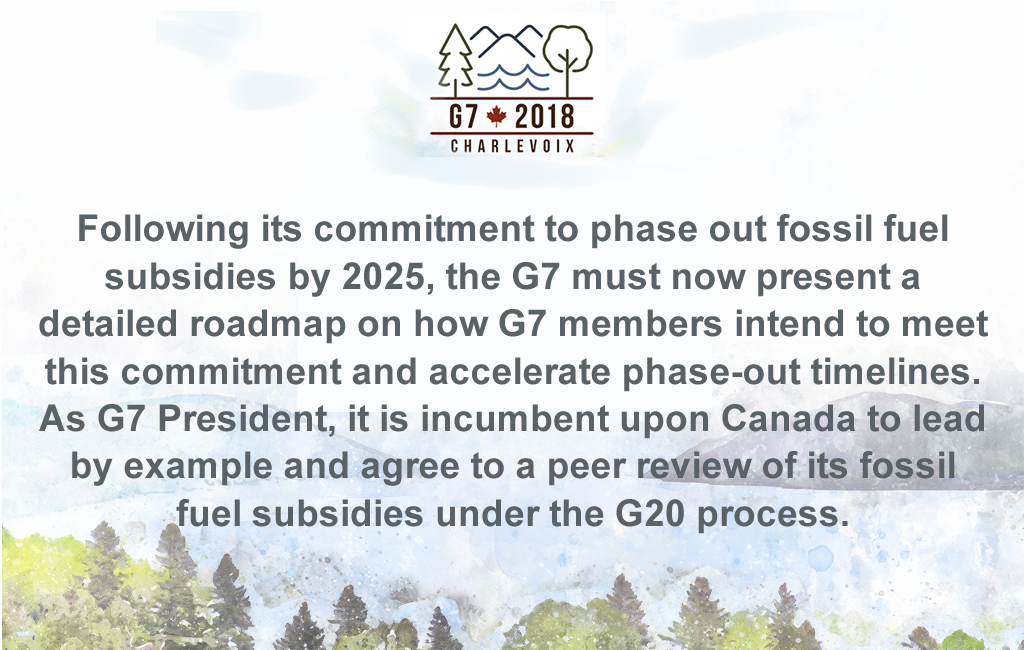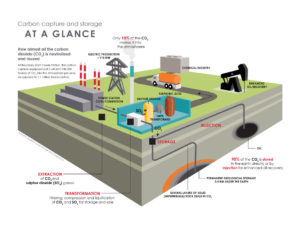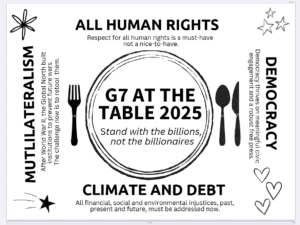Canada is the G7 President in 2018. Climate change is one of the five pillars of their G7 presidency. In alignment with the Global Taskforce to the G7, Citizens’ Climate Lobby endorses their following recommendation to the G7: Following its commitment to phase out fossil fuel subsidies by 2025, the G7 must now present a detailed roadmap on how G7 members intend to meet this commitment and accelerate phase-out timelines. As G7 President, it is incumbent upon Canada to lead by example and agree to a peer review of its fossil fuel subsidies under the G20 process. Fossil Fuel subsidies work against efforts to reduce Greenhouse Gas(GHG) emissions. The Canadian Auditor General’s 2017 report on fossil fuel subsidies concluded: that “… inefficient subsidies to the fossil fuel sector encourage wasteful consumption, undermine efforts to address climate change, and discourage investment in clean energy sources.” Canada and the G20 committed in 2009 to “rationalize and phase-out inefficient fossil fuel subsidies” by 2025, and reaffirmed that commitment in 2016. Ending fossil fuel subsidies was a clear and specific promise in the Liberal Government’s 2015 election platform. The Auditor General provides this list of potential fossil fuel subsidies: Some, including the International Monetary Fund (IMF) would expand the list to include the financial impacts of GHG emissions on the environment and human health. Estimates of subsidies could potentially also include “in kind” expenditures for government programs aimed at facilitating or promoting fossil fuel development and use. This lack of consensus on what should be classed as a fossil fuel subsidy is a significant impediment to their phase out. The Auditor General concluded that without a clear understanding of the fossil fuel subsidies covered by the G20 commitment, and a implementation plan with timelines, the Canadian Department of Finance cannot provide the support needed for Canada to meet the commitment by 2025. Since 2010, CCL Canada’s position is that governments need to phase-out all existing fossil fuels subsidies, including tax credits, over the five years following enactment of a federal carbon price. The first step is to reach agreement on what constitutes a fossil fuel subsidy. The International Institute for Sustainable Development (IISD) concluded that Canadian fossil fuel subsidies (which they define as financial benefits in the form of tax breaks and direct cash) amounted to about $3.3 billion in 2013-2014. Half of these were provincial while the other half were federal subsidies. The biggest federal subsidy identified by the IISD, about $1.0 billion per year, was for Canadian Development Expenses. Other federal subsidies have declined since the 2013-2014 snapshot used by the IISD: Provincial fossil fuel subsidies are also significant. An OECD database provides an approximate estimate of total provincial subsidies at $3 billion in 2016. To put this in perspective, annual carbon tax revenue in BC and Alberta was $1.2 billion and $1 billion, respectively, in recent years. In Ontario fossil fuel subsidies are estimated at $0.6 billion, compared to the $1.9 billion in revenues from cap and trade in 2017. When fossil fuels are produced and consumed, there are many unintended negative impacts on the environment and on human health. The cost of dealing with these unintended effects, or “externalities”, falls to society, rather than to the consumer of the fossil fuel. When governments take on the costs of the fossil fuel industry’s unintended impacts, some would argue that governments are subsidizing the industry. In 2015 the International Monetary Fund (IMF) released a working paper which estimated fossil fuel subsidies at an unprecedented level of $5.3 trillion. The IMF included externalities in this estimate, defining energy subsidies as the difference between what consumers pay for energy and its “true costs”. Not everyone agrees that externalities should be viewed as subsidies. Neither the International Institute for Sustainable Development(IISD) nor the Organization for Economic Cooperation and development(OECD) include externalities in their estimates of fossil fuel subsidies. Yet the costs to governments of these unintended impacts of fossil fuels are significant. Here are just two examples: Given the urgency of the climate change crisis, we need to be aware of the many ways we may be subsidizing fossil fuels, and in effect working against carbon pricing. A January 2018 study by the Parkland Institute estimates that the Big Five (Canadian Natural Resources Limited (CNRL), Suncor Energy, Cenovus Energy, Imperial Oil and Husky Energy) in Alberta are sitting on an almost two trillion dollar liability. “Alberta’s oil sands industry is a carbon bubble—a petroleum-oriented economy that has a high risk of instability, crisis, and even collapse,” the report states. There is an urgent need to reconsider the fossil fuel industry’s economic value chain in light of climate change. Fossil fuel subsidies are artificially incentivizing companies to sink costs into infrastructure with dubious prospects. The costs of orphaned wells, tailing ponds, climate disruptions, and other externalities will be borne by future taxpayers long after fossil fuels have ceased to generate wealth. Climate change is a game changer. Laser Talk 1: Inefficient Fossil Fuel Subsidies and the G7
Laser Talk 2: What are fossil fuel subsidies, and why are we concerned?
Laser Talk 3: Details about Canadian Fossil Fuel Subsidies
Laser Talk 4: Indirect Fossil Fuel Subsidies
Laser Talk 5: Fossil Fuel Subsidies and the Carbon Bubble in Canada
LASER TALKS: Fossil Fuel Subsidies
Home » CCL Canada News » LASER TALKS: Fossil Fuel Subsidies












